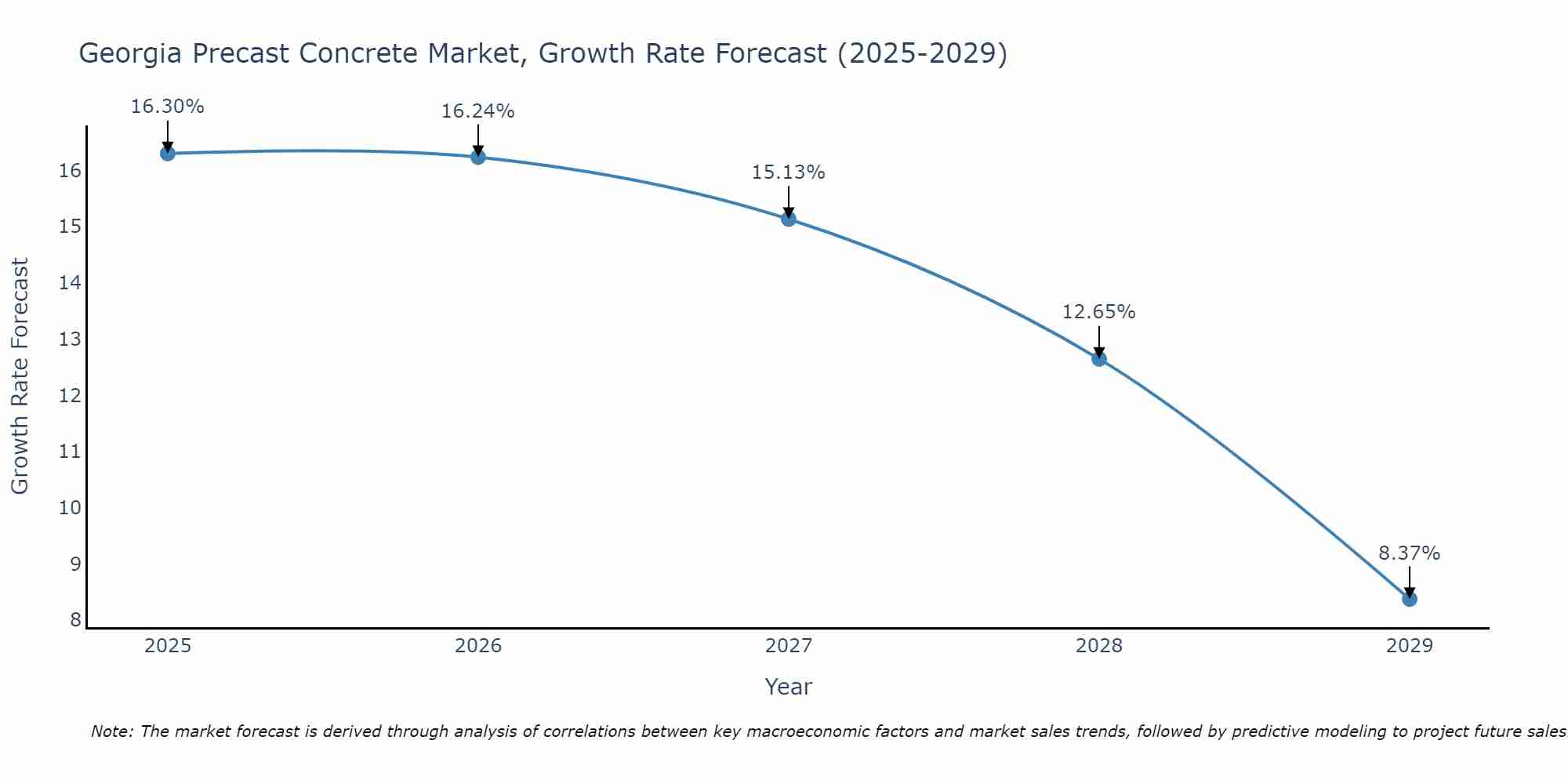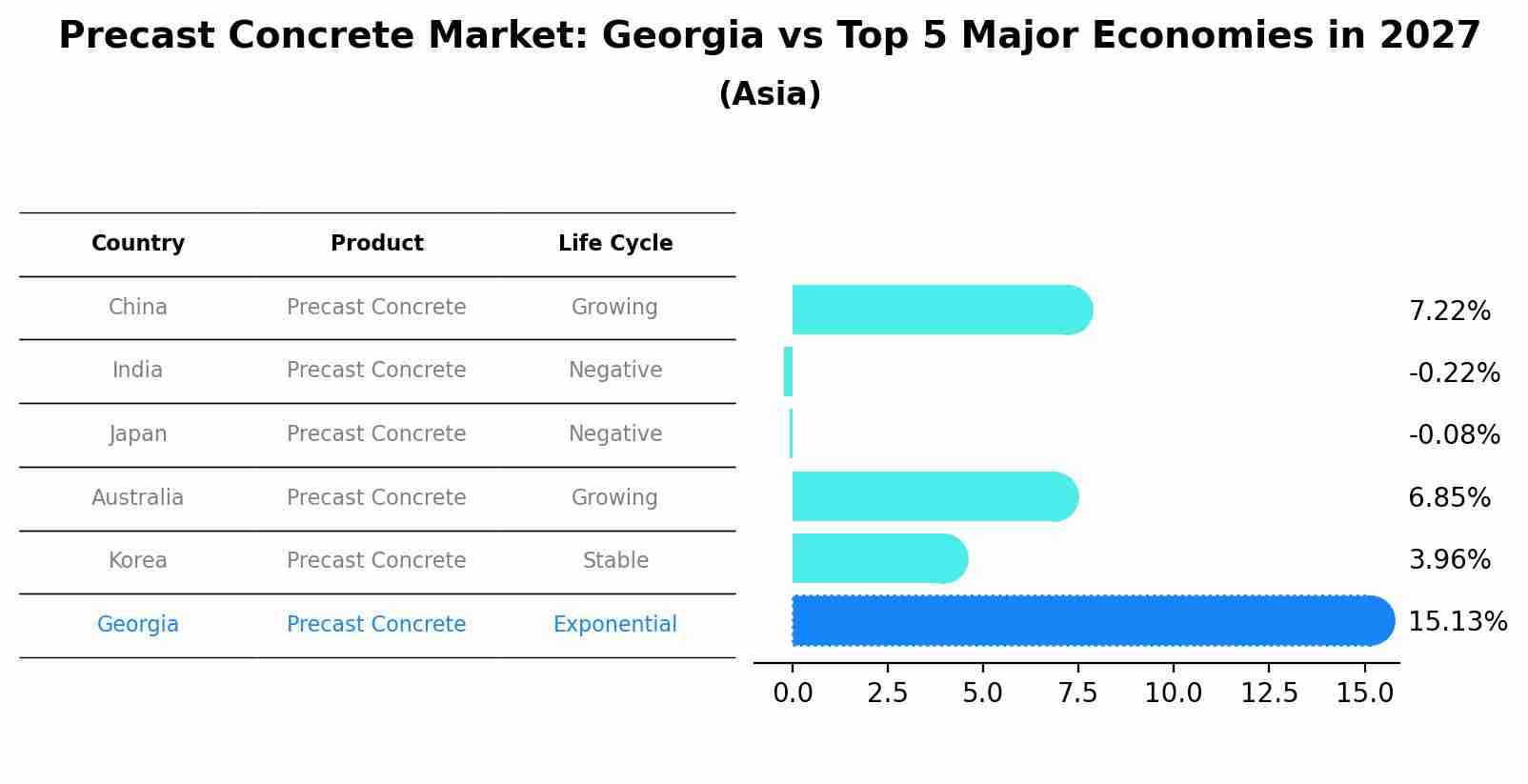Georgia Precast Concrete Market Outlook | Trends, COVID-19 IMPACT, Growth, Value, Revenue, Forecast, Size, Share, Industry, Analysis & Companies
| Product Code: ETC372900 | Publication Date: Aug 2022 | Updated Date: Jul 2025 | Product Type: Market Research Report | |
| Publisher: 6Wresearch | Author: Sumit Sagar | No. of Pages: 75 | No. of Figures: 35 | No. of Tables: 20 |
Georgia Precast Concrete Market Size Growth Rate
The Georgia Precast Concrete Market could see a tapering of growth rates over 2025 to 2029. Although the growth rate starts strong at 16.30% in 2025, it steadily loses momentum, ending at 8.37% by 2029.

Precast Concrete Market: Georgia vs Top 5 Major Economies in 2027 (Asia)
The Precast Concrete market in Georgia is projected to grow at a exponential growth rate of 15.13% by 2027, within the Asia region led by China, along with other countries like India, Japan, Australia and South Korea, collectively shaping a dynamic and evolving market environment driven by innovation and increasing adoption of emerging technologies.

Georgia Precast Concrete Market Synopsis
The Georgia Precast Concrete Market is experiencing steady growth due to the increasing demand for durable, sustainable construction materials in the state. Factors driving this growth include the rising investments in infrastructure projects, urbanization, and the preference for precast concrete products for their cost-effectiveness and time efficiency in construction. Key players in the market are focusing on product innovations, such as advanced mix designs and surface finishes, to cater to the diverse needs of customers in sectors like residential, commercial, and industrial construction. Additionally, the state`s emphasis on green building practices and LEED certification requirements is further boosting the adoption of precast concrete solutions. Overall, the Georgia Precast Concrete Market is poised for continued expansion in the coming years, driven by these favorable market dynamics.
Georgia Precast Concrete Market Trends
The Georgia precast concrete market is experiencing significant growth driven by the increasing demand for durable and sustainable construction materials. Key trends in the market include the adoption of advanced manufacturing technologies to improve efficiency and precision in precast concrete production, the rising popularity of architectural precast elements for enhancing building aesthetics, and the growing use of precast concrete systems in infrastructure projects due to their cost-effectiveness and rapid installation benefits. Additionally, there is a noticeable shift towards incorporating recycled materials in precast concrete production to align with sustainability goals and environmental regulations. Overall, the Georgia precast concrete market is poised for continued expansion as the construction industry seeks innovative solutions to address the challenges of urbanization and infrastructure development.
Georgia Precast Concrete Market Challenges
In the Georgia precast concrete market, challenges include increasing competition from traditional cast-in-place methods, fluctuating raw material costs, and the need for consistent quality control to meet stringent building codes and regulations. Additionally, transportation and logistical issues can impact project timelines and costs, especially for large precast components. Market saturation and the need for continuous innovation in design and production processes also pose challenges for precast concrete manufacturers in Georgia. To remain competitive and address these challenges, companies in the Georgia precast concrete market must focus on efficiency improvements, cost control measures, strategic partnerships, and investing in technology to enhance productivity and quality.
Georgia Precast Concrete Market Investment Opportunities
Investment opportunities in the Georgia precast concrete market include the growing demand for infrastructure development, such as bridges, highways, and buildings, which drives the need for precast concrete products. With the construction industry on the rise in Georgia, there is a steady demand for precast concrete elements due to their cost-effectiveness, durability, and efficiency in construction projects. Additionally, the focus on sustainable and eco-friendly construction practices is leading to increased adoption of precast concrete, presenting opportunities for investors to capitalize on this trend. Investing in precast concrete manufacturing companies, distribution channels, or construction projects utilizing precast concrete can be lucrative in the Georgia market as the industry continues to expand and evolve.
Jordan Agar Market Government Policies
The Georgia Precast Concrete Market is governed by various regulations and policies aimed at ensuring the quality, safety, and sustainability of precast concrete products. The Georgia Department of Transportation (GDOT) sets standards for precast concrete used in infrastructure projects to meet specific requirements for strength, durability, and performance. Additionally, the Environmental Protection Division (EPD) oversees environmental regulations to minimize the impact of precast concrete manufacturing on air and water quality. The state also encourages the use of sustainable practices in the precast concrete industry through incentives and certifications promoting energy efficiency and waste reduction. Overall, government policies in Georgia strive to uphold high standards in the precast concrete market while promoting environmental responsibility and innovation.
Georgia Precast Concrete Market Future Outlook
The future outlook for the Georgia Precast Concrete Market appears promising as the construction industry continues to grow in the state. With the increasing focus on sustainable and cost-effective building solutions, precast concrete offers benefits such as durability, efficiency, and versatility. The growing emphasis on infrastructure development, residential construction, and commercial projects in Georgia is expected to drive the demand for precast concrete products. Additionally, advancements in manufacturing techniques and design capabilities are likely to further boost market growth. As the construction sector in Georgia evolves, the precast concrete market is poised for expansion, presenting opportunities for manufacturers, suppliers, and contractors to capitalize on the state`s ongoing development projects and infrastructure initiatives.
Key Highlights of the Report:
- Georgia Precast Concrete Market Outlook
- Market Size of Georgia Precast Concrete Market, 2021
- Forecast of Georgia Precast Concrete Market, 2031
- Historical Data and Forecast of Georgia Precast Concrete Revenues & Volume for the Period 2018 - 2031
- Georgia Precast Concrete Market Trend Evolution
- Georgia Precast Concrete Market Drivers and Challenges
- Georgia Precast Concrete Price Trends
- Georgia Precast Concrete Porter's Five Forces
- Georgia Precast Concrete Industry Life Cycle
- Historical Data and Forecast of Georgia Precast Concrete Market Revenues & Volume By Product for the Period 2018 - 2031
- Historical Data and Forecast of Georgia Precast Concrete Market Revenues & Volume By Structural Building Components for the Period 2018 - 2031
- Historical Data and Forecast of Georgia Precast Concrete Market Revenues & Volume By Architectural Building Components for the Period 2018 - 2031
- Historical Data and Forecast of Georgia Precast Concrete Market Revenues & Volume By Transportation Products for the Period 2018 - 2031
- Historical Data and Forecast of Georgia Precast Concrete Market Revenues & Volume By Water & Waste Handling Products for the Period 2018 - 2031
- Historical Data and Forecast of Georgia Precast Concrete Market Revenues & Volume By Others for the Period 2018 - 2031
- Historical Data and Forecast of Georgia Precast Concrete Market Revenues & Volume By End-use for the Period 2018 - 2031
- Historical Data and Forecast of Georgia Precast Concrete Market Revenues & Volume By Residential for the Period 2018 - 2031
- Historical Data and Forecast of Georgia Precast Concrete Market Revenues & Volume By Non-residential for the Period 2018 - 2031
- Historical Data and Forecast of Georgia Precast Concrete Market Revenues & Volume By Infrastructure for the Period 2018 - 2031
- Georgia Precast Concrete Import Export Trade Statistics
- Market Opportunity Assessment By Product
- Market Opportunity Assessment By End-use
- Georgia Precast Concrete Top Companies Market Share
- Georgia Precast Concrete Competitive Benchmarking By Technical and Operational Parameters
- Georgia Precast Concrete Company Profiles
- Georgia Precast Concrete Key Strategic Recommendations
Frequently Asked Questions About the Market Study (FAQs):
- Single User License$ 1,995
- Department License$ 2,400
- Site License$ 3,120
- Global License$ 3,795
Search
Related Reports
- Europe Flooring Market (2025-2031) | Outlook, Share, Industry, Trends, Forecast, Companies, Revenue, Size, Analysis, Growth & Value
- Saudi Arabia Manlift Market (2025-2031) | Outlook, Size, Growth, Trends, Companies, Industry, Revenue, Value, Share, Forecast & Analysis
- Uganda Excavator, Crane, and Wheel Loaders Market (2025-2031) | Strategy, Consumer Insights, Analysis, Investment Trends, Opportunities, Growth, Size, Share, Industry, Revenue, Segments, Value, Segmentation, Supply, Forecast, Restraints, Outlook, Competition, Drivers, Trends, Demand, Pricing Analysis, Competitive, Strategic Insights, Companies, Challenges
- Rwanda Excavator, Crane, and Wheel Loaders Market (2025-2031) | Strategy, Consumer Insights, Analysis, Investment Trends, Opportunities, Growth, Size, Share, Industry, Revenue, Segments, Value, Segmentation, Supply, Forecast, Restraints, Outlook, Competition, Drivers, Trends, Demand, Pricing Analysis, Competitive, Strategic Insights, Companies, Challenges
- Kenya Excavator, Crane, and Wheel Loaders Market (2025-2031) | Strategy, Consumer Insights, Analysis, Investment Trends, Opportunities, Growth, Size, Share, Industry, Revenue, Segments, Value, Segmentation, Supply, Forecast, Restraints, Outlook, Competition, Drivers, Trends, Demand, Pricing Analysis, Competitive, Strategic Insights, Companies, Challenges
- Angola Excavator, Crane, and Wheel Loaders Market (2025-2031) | Strategy, Consumer Insights, Analysis, Investment Trends, Opportunities, Growth, Size, Share, Industry, Revenue, Segments, Value, Segmentation, Supply, Forecast, Restraints, Outlook, Competition, Drivers, Trends, Demand, Pricing Analysis, Competitive, Strategic Insights, Companies, Challenges
- Israel Intelligent Transport System Market (2025-2031) | Strategy, Consumer Insights, Analysis, Investment Trends, Opportunities, Growth, Size, Share, Industry, Revenue, Segments, Value, Segmentation, Supply, Forecast, Restraints, Outlook, Competition, Drivers, Trends, Demand, Pricing Analysis, Competitive, Strategic Insights, Companies, Challenges
- Uganda Precast and Aggregate Market (2025-2031) | Strategy, Consumer Insights, Analysis, Investment Trends, Opportunities, Growth, Size, Share, Industry, Revenue, Segments, Value, Segmentation, Supply, Forecast, Restraints, Outlook, Competition, Drivers, Trends, Demand, Pricing Analysis, Competitive, Strategic Insights, Companies, Challenges
- Australia IT Asset Disposal Market (2025-2031) | Strategy, Consumer Insights, Analysis, Investment Trends, Opportunities, Growth, Size, Share, Industry, Revenue, Segments, Value, Segmentation, Supply, Forecast, Restraints, Outlook, Competition, Drivers, Trends, Demand, Pricing Analysis, Competitive, Strategic Insights, Companies, Challenges
- UAE Building Thermal Insulation Market Outlook (2025-2031) | Revenue, Companies, Share, Trends, Growth, Size, Forecast, Industry, Analysis & Value
Industry Events and Analyst Meet
Our Clients
Whitepaper
- Middle East & Africa Commercial Security Market Click here to view more.
- Middle East & Africa Fire Safety Systems & Equipment Market Click here to view more.
- GCC Drone Market Click here to view more.
- Middle East Lighting Fixture Market Click here to view more.
- GCC Physical & Perimeter Security Market Click here to view more.
6WResearch In News
- Doha a strategic location for EV manufacturing hub: IPA Qatar
- Demand for luxury TVs surging in the GCC, says Samsung
- Empowering Growth: The Thriving Journey of Bangladesh’s Cable Industry
- Demand for luxury TVs surging in the GCC, says Samsung
- Video call with a traditional healer? Once unthinkable, it’s now common in South Africa
- Intelligent Buildings To Smooth GCC’s Path To Net Zero













